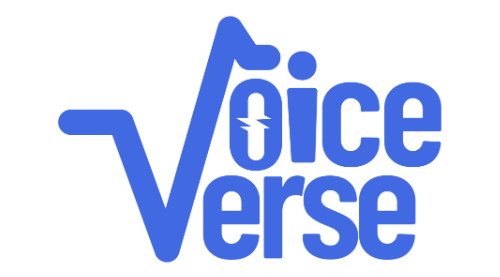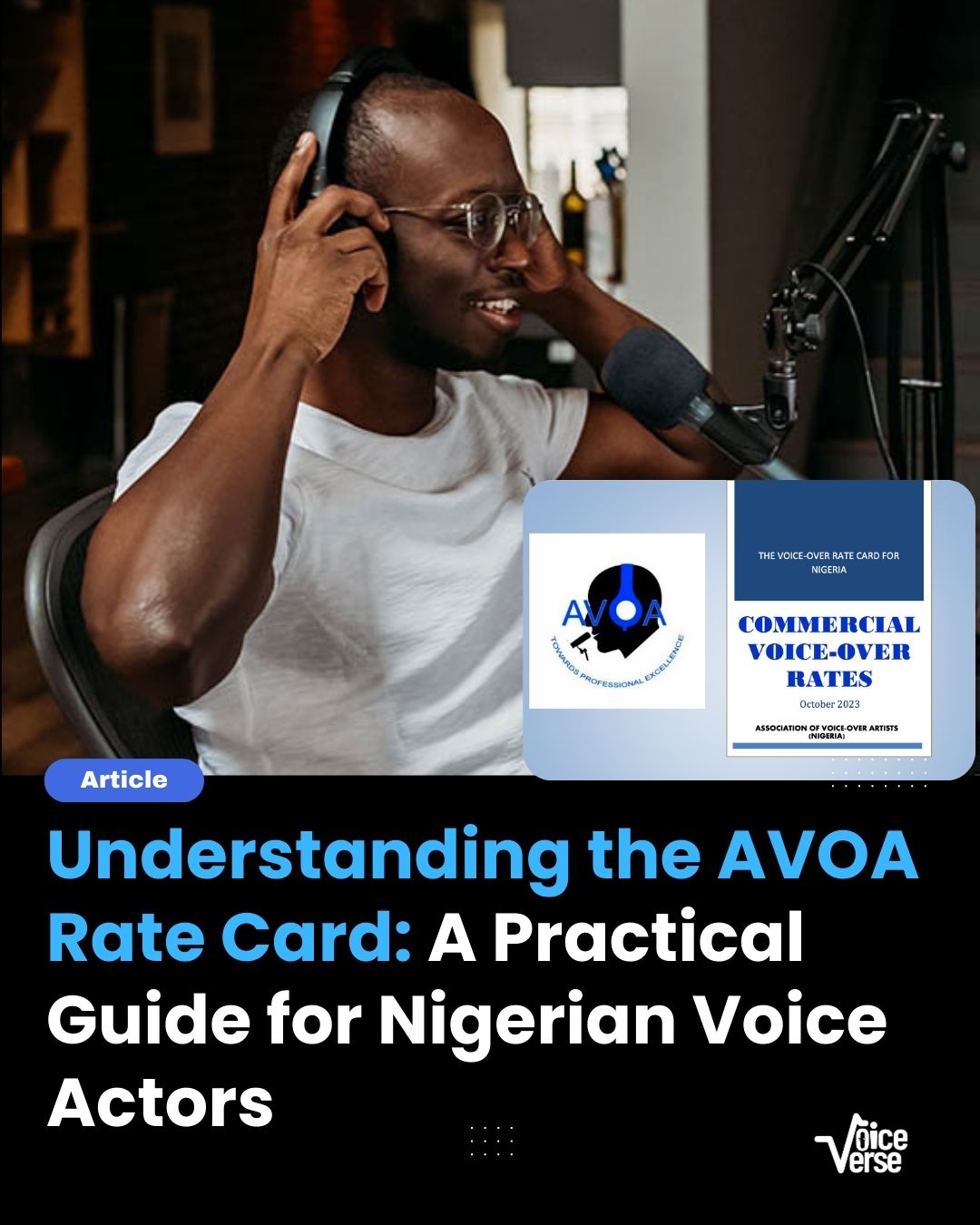By Tolulope Kolade (Tcode) – for VoiceverseNG
Let’s be honest—talking about rates can be awkward. But if you’re a Nigerian voice actor trying to build a thriving, sustainable career, you need to get comfortable with the money conversation. The good news? You don’t have to figure it all out on your own.
The Association of Voice-Over Artists (AVOA) released an updated rate card in October 2023, and it’s a game-changer. Whether you’re just starting out or you’re already booking steady gigs, this guide will help you understand how to use the AVOA rate card to set fair prices, confidently negotiate with clients, and protect the value of your work.
What Influences Voiceover Rates in Nigeria?
Here’s the deal: voiceover rates in Nigeria aren’t random. They’re based on several key factors that you (and your clients) need to understand:
1. Usage:
Where and how long will the voiceover be used? A TV commercial airing nationwide isn’t the same as a corporate explainer video posted on a company’s YouTube. The more public, commercial, and long-term the use, the higher your rate should be.
2. Type of Work:
The AVOA rate card covers everything from commercials to animation, e-learning, audio dramas, documentaries, podcasts, games, IVRs, and even live announcements. Each has its own rate range. Knowing where your gig falls helps you price appropriately.
3. Extras and Add-ons:
Pick-ups, extra characters, audio editing, mixing, and usage renewals—these all attract additional fees. The AVOA card clearly outlines what counts as extra work and what to charge for it.
Using the AVOA Rate Card Without Feeling Lost
The AVOA rate card isn’t a strict price list—it’s a guide. It gives minimum suggested rates that help you start the negotiation on the right foot. For example, the suggested starting rate for a radio commercial in Lagos, Abuja, or Port Harcourt (major commercial cities in Nigeria) is ₦100,000. That’s not a fixed rate, but a benchmark to help prevent underpricing.
The rate card is arranged alphabetically by category, so it’s easy to find what you need. Each category comes with usage notes, rate suggestions, and special rules. It’s super helpful when you’re quoting or reviewing a job brief.
Real Nigerian Pricing Examples (Based on AVOA)
To give you some context, here are a few real-world examples drawn from the AVOA card:
- Radio Commercial: Starts at ₦100,000 in major cities.
- TV Commercial (family brand): Around ₦150,000, plus fees for amendments or extra characters.
- 5-Minute Explainer Video (company website): ₦150,000, negotiable for paid promotion or longer use.
- Non-Commercial YouTube Content: ₦150,000 for the first 5 minutes, ₦50,000 for every additional 5 minutes.
- Internal E-learning Project: Can range from ₦900,000 to over ₦2 million, depending on the length and editing needs.
- Audio Drama (30 mins, non-commercial): ₦50,000 per character, per artist.
- Voice of God (pre-recorded, event): Between ₦250,000 and ₦750,000.
These are starting points—seasoned pros like Segun Arinze, the president of AVOA and a renowned actor, can command much more based on experience and brand value.
So, How Should You Set Your Rates?
Glad you asked. Here’s a simple framework:
- Know your niche: What kind of voiceover work do you love and excel at? Check where it fits on the AVOA card.
- Understand usage: Clarify with clients how, where, and for how long the work will be used.
- Set your baseline: Based on the AVOA ranges and your experience level, create your minimum rates.
- Include extras: Have clear pricing for things like revisions, editing, mixing, or additional characters.
- Be flexible—but firm: Discount where necessary, but never sell yourself short. Always negotiate from a place of value.
- Set clear payment terms: Agree on payment methods (bank transfers, online platforms, etc.) that are safe and common in Nigeria.
Educating Clients Is Part of the Job
Not every client will understand how voiceover pricing works. Some will even expect you to “just voice it” for exposure or peanuts. That’s where you come in—not just as a talent, but as a professional.
AVOA is doing the work of educating agencies and brands, but you still have to advocate for yourself. Explain usage. Break down the rate structure. Let them know that charging fairly isn’t arrogance—it’s professionalism.
Challenges We’re Still Facing
Let’s not pretend the Nigerian market is perfect. Underpricing is still a problem. Some agencies resist fair rates and expect seasoned talent to work for less. At an AVOA workshop held on April 5, 2025, voice actor Joy Ogbekene, who doubled as the General Secretary of the Association, made it clear: AVOA is engaging with agencies, but at the end of the day, it’s your call whether to accept unfair offers.
Chioma BBB, another respected name in the game, said something that stuck with me:
“When we consistently undercharge, we not only cheat ourselves—we weaken the industry.”
Enough said.
Looking Ahead: What You Can Do
The future of voiceover in Nigeria is promising—but only if we keep raising the standard. Platforms like VoiceverseNG are here to shine a light on our progress, amplify opportunities, and educate the community.
So here’s what I’ll leave you with:
✅ Know your value.
✅ Learn how to communicate it.
✅ Use tools like the AVOA rate card to stand your ground.
✅ Keep growing, learning, and connecting with fellow VOs.
If we do this right, the next generation of voice actors won’t have to struggle to prove that this is real work—because we’ve already done it.
You’ve got this.
—
Tolulope Kolade (Tcode) is a voiceover artist, coach, and podcast host passionate about elevating the African voiceover industry. Follow him on @Tcode_70 and keep learning with VoiceverseNG.



